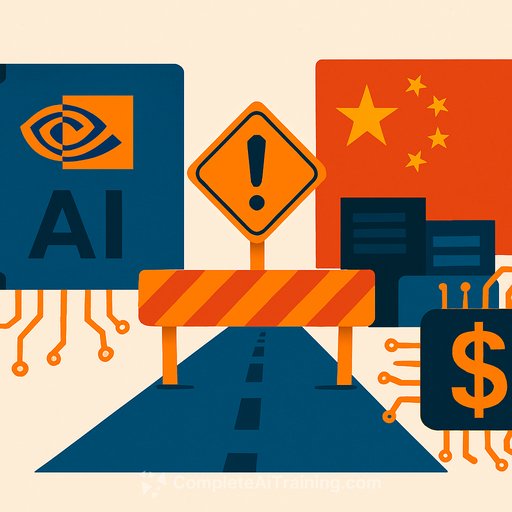Nvidia’s H20 AI Chip Sales to China Hit by U.S. Licensing Delays
Nvidia is facing a significant setback as the sale of its H20 AI chips in China stalls due to delays in the U.S. Department of Commerce’s export licensing process. Despite hopes raised by a July statement from U.S. Secretary of Commerce Howard Lutnick, the export licenses required for the H20 chip remain pending.
This isn’t just a minor delay; it’s a strategic challenge for Nvidia’s sales efforts in China. The Chinese market is critical for Nvidia’s revenue plans through 2025, making timely access to export licenses essential. Unfortunately, internal issues within the Department of Commerce — including staffing shortages and communication breakdowns — have created a bottleneck that impacts many technology companies dependent on these approvals.
Why the Delay Matters for Sales Professionals
For those in sales, this delay means uncertainty around product availability in a key market. The H20 chip is a modified version built to comply with U.S. export controls, but even this isn’t enough to speed up licensing. As a result, clients and partners in China face longer wait times, which can stall deals and complicate forecasting.
Sales teams need to be prepared to manage expectations and adjust strategies as the licensing situation evolves. Keeping communication clear and proactive with customers about delays can help maintain trust during this period of uncertainty.
National Security Concerns Adding Pressure
The licensing hold-up is also fueled by debates among national security experts. A group of 20 experts has pushed for stricter controls on the H20 chip due to worries it might be used in military or surveillance applications that could threaten U.S. interests. Despite being a downgraded model, the chip’s capabilities still raise concerns amid the ongoing U.S.-China competition in AI and semiconductor technology.
This tension means regulatory scrutiny will likely remain high. For sales teams, this could translate into further restrictions or changes in product availability depending on how export controls evolve.
Broader Impact on the AI Industry and Supply Chains
The delays don’t just impact Nvidia. Holding back access to advanced AI chips could slow innovation in certain regions, creating uneven development in AI technology globally. For investors and industry watchers, this adds another layer of risk to the semiconductor sector, showing how geopolitical factors directly influence business outcomes.
Supply chain stability is also at risk. Timely approvals are crucial for meeting demand and fulfilling contracts. Continued delays could disrupt production schedules and sales pipelines.
What Needs to Change
- Increased staffing at the Department of Commerce to reduce the backlog.
- Streamlined licensing procedures that accelerate review times.
- Clearer communication between regulators and industry players.
- Better policy guidance to help companies adapt quickly.
Without these improvements, delays could persist, affecting American tech leadership and the global AI chip market.
Balancing Security and Sales Strategy
This situation highlights the tough balance between protecting national security and supporting tech companies in global markets. For sales professionals, this means staying adaptable and informed about regulatory changes that can impact product availability and market access.
Understanding these dynamics is key to navigating sales strategies in AI hardware. For those interested in strengthening their knowledge in AI and related technologies, explore courses on Complete AI Training to stay ahead in this evolving field.
As demand for AI tech grows, efficient export licensing will become increasingly important for maintaining competitive advantages. How this licensing backlog resolves will offer insight into how the U.S. manages technology, policy, and international relations moving forward.
Your membership also unlocks:






